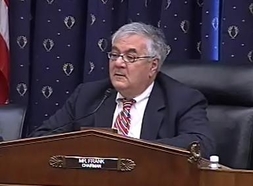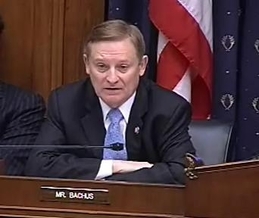






Barney Frank's Poker Hearing Concludes Without A VoteCommittee Will Continue Discussion of the Bill in 2010 |
|
|

The meeting was mostly informative, as various panel experts explained their background, what stance their organization held on Frank’s bill to regulate the industry, and answered questions. However, it was sometimes contentious, as Rep. Frank and Rep. Spencer Bachus (R-AL) traded their very opposing viewpoints.
Rep. Frank opened the hearing with a statement on the necessity of regulation, and reiterated his belief that Congress was wrong to originally pass the Unlawful Internet Gambling Enforcement Act (UIGEA) in 2006, a law that makes it difficult for payment processors to transfer money to online gaming sites.
“I continue to believe that it is a great mistake for the Congress of the United States to tell adults what to do with their own money on a voluntary basis,” said Rep. Frank, the chairman of the committee.

“I believe that Internet gambling is, has been, and will continue to be a substantial threat to our youth … It leads to addiction, bankruptcy, and crime,” said Rep. Bachus.
Rep. Bachus also shared some of the contents of a letter he received from an official of the FBI’s cyber division, which claimed that “there are several ways to cheat at online poker,” specifically referencing potential collusion by players at a table. Shawn Henry, the assistant director for the division, did acknowledge that poker sites had the capability to detect such cheating, saying, “The online poker vendors could detect this activity and put in place safeguards to discourage cheating, although it is unclear what the incentive would be for the vendor.”
The Poker Players Alliance blasted the claim a few hours later in a press release entitled, “PPA: FBI Letter Wrongfully Cites Online Poker Myths, But Underscores Need for Licensing and Regulation.”
“Every concern the letter raises is better addressed by licensing and regulation than by prohibition,” said John Pappas, the Poker Players Alliance executive director. “The letter misconstrues much about the current state of online poker, but it does so in a way that clearly makes the case for why federal oversight is necessary.”
The committee called upon seven witnesses during the hearing: Robert Martin, the tribal chairman of the Morongo Band of Mission Indians; Parry Aftab, the executive director of WiredSafety; Malcolm K. Sparrow, of John F. Kennedy School of Government at Harvard University; Keith S. Whyte, the executive director of the National Council on Problem Gambling; Jim Dowling of the Dowling Advisory Group; Samuel A. Vallandingham, the chief information officer and vice president of The First State Bank on behalf of the Independent Community Bankers of America; and Mike Brodsky, the executive chairman of Youbet.com.
Martin, whose tribe has independently pursued intrastate online poker in California, was the only person on the panel who officially opposed Frank’s call for federal regulation.

“I get about a thousand e-mails a day from people who come to us for help, and many of those are relating to online gambling,” said Aftab. “It is particularly interesting, and I call it ironic, that I am sitting here today, saying that the only way to protect consumers from online gambling risks is by legalizing it. I never thought I would ever say such a thing, but if we don’t legalize it, we can’t regulate it.”
Aftab said the current policy on online gaming is flawed, saying it represents a “hear no evil, see no evil” strategy.
After each witness testified and answered questions from the members of Congress in attendance, Rep. Frank adjourned the meeting and said that Congress would continue the conversation after the New Year.
